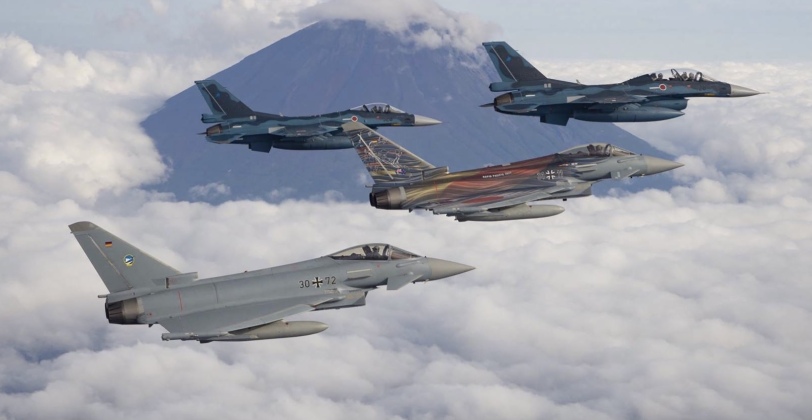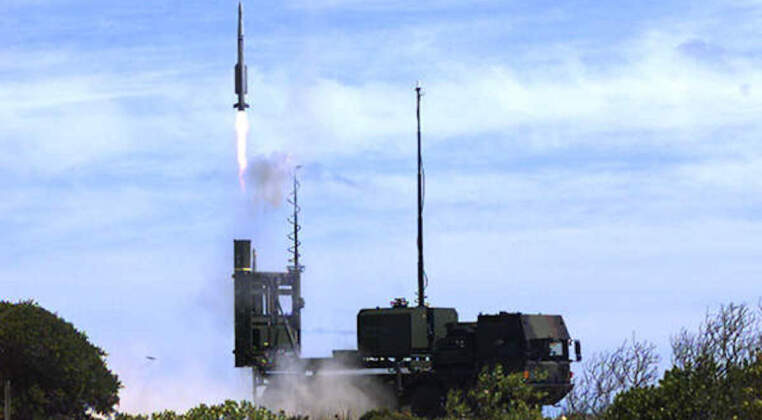News
As Economy Crashes Germany Sends Fighter Jets to East China Sea, Missiles to Ukraine and MPs to Taiwan

Germany has increasingly emerged in 2022 as a country willing to more assertively pursue Western Bloc security interests overseas, with the government of Chancellor Olaf Scholz having recently escalated Berlin’s foreign policy turn away from the Angela Merkel era engagement and integration with China and conflict management with Russia. A number of new policy decisions aimed at more strongly siding with the United States against both Western adversaries has reflected this increasingly clearly, one of the most notable being its unprecedented military deployments to East Asia following precedents set by the U.S., France and Britain.
Following Germany’s participation in the Rapid Pacific exercises in Australia using Eurofighter fourth generation aircraft and supporting assets, which was itself unprecedented, the same fighter class has been deployed to Japan for its first ever air force exercises in the country. Training for potential conflict with China was widely cited as the primary contingency for which the two were preparing, with German ambassador to Tokyo promising that further deployments would follow in future. Although Japan deployed its F-2 fighters for the exercises, it would reportedly provide information on operating F-35 fifth generation fighters which it already fields and which German placed its first orders for earlier in the year. Although the Merkel administration consistently rejected the possibility of F-35 purchases to protect local industry, with Air Force Chief of Staff Lt. Gen. Karl Mullner having been pressed to resign due to his controversial advocation of such acquisitions, the Scholz administration announced very soon after coming to power that it would acquire the aircraft.
While German deployments to Japan preparing for East China Sea operations are expected to raise tensions with the country’s leading trading partner China, the dispatch of a delegation of six members of parliament to Taiwan on October 1 only worsened this further. Beijing has warned repeatedly that such visits undermine the One China Policy. Taiwan is recognised by all the United Nations and all UN member states as part of China, although its separate government as a result of the technically ongoing Chinese Civil War has made it a focal point for Sino-U.S. tensions. The visit follows multiple similar missions by U.S. and other European lawmakers including U.S. House Speaker Nancy Pelosi, and could potentially lead to retaliation by Beijing which views such visits to a territory internationally recognised as its own as provocative.

In parallel to visits to Taiwan and fighter deployments to Japan, German Defence Minister Christine Lambrecht made an unannounced visit to Ukraine on October 1 where she vowed to increase military aid including providing Iris-T SLM air defence systems, which will complement the Gepard anti aircraft self propelled guns already delivered. Germany’s massive support for Ukraine’s ongoing war effort against Russia including provision of €743 million of military aid has further worsened relations with Moscow, while the loss of Russian markets and natural gas has been devastating for the German economy. The fallout has been even greater than that from the first rounds of economic sanctions which were imposed in 2014. Ukraine has nevertheless complained that German armaments delivered have been qualitatively sub par, with German artillery in particular having a poor performance and its tanks expected to potentially fare worse if dispatched.

Amid growing strategic commitments abroad to bolster adversaries or potential adversaries of China and Russia, Germany’s economy has faced a growing crisis with inflation rising to levels not seen since the Nazi era. With over 15,000 German stores facing bankruptcy due to “exploding energy costs,” according to Der Spiegel, the German Retail Association has warned that this contributed to an “existentially threatening” situation and that tens of thousands of firms could go bankrupt by the end of 2023. Energy costs are on average 247% what they were at the beginning of the year. Geopolitical issues have placed a wide range of sectors at risk, and while 5G coverage in Germany is among the widest in the world reliant overwhelmingly on infrastructure from China’s Huawei, Berlin continues to face pressure to remove this and thus reverse these gains. The Scholz government is expected to be more likely to take such a stance than its predecessor. Whether private sector pressure could lead Berlin to move away from confrontation with Moscow and Beijing, and the economic and strategic implications of the Scholz administration’s current course, remain to be seen.












